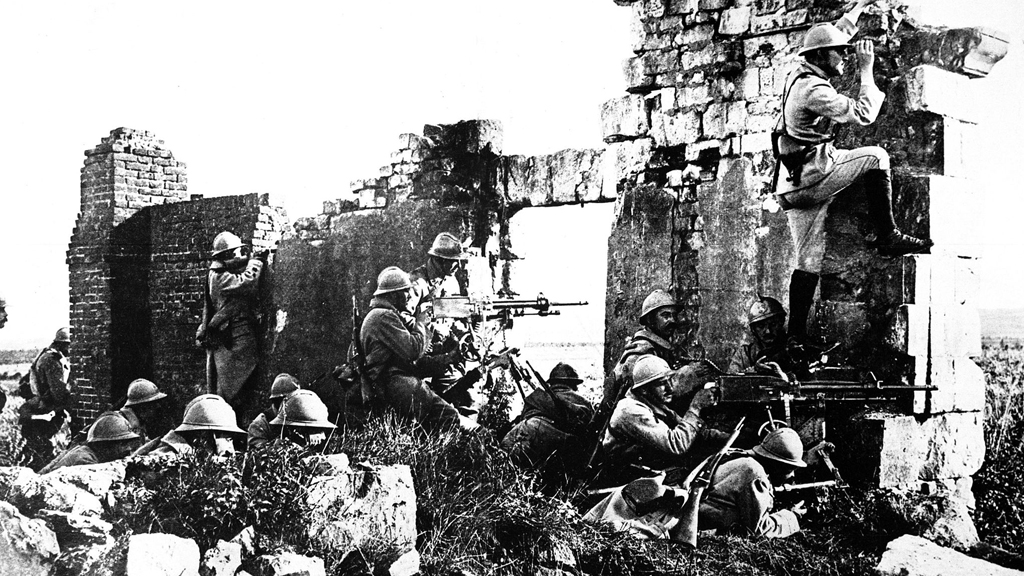The First World War, the most appallingly savage international conflict in all preceding history, had a profound impact on world Jewry. This was due to the existence of a large concentration of Jews within one of the principal arenas, the enlistment of unprecedented numbers of Jews to the armies of the belligerent nations and the success of Jewish leaders in influencing the political policies of the major powers. Furthermore, increasing tensions during the war years deepened the hostile attitudes towards the Jews, particularly in Germany and in Eastern Europe.
Displaced on the Eastern Front
The war on the eastern front between Russia and the Central Powers (Germany and Austria) was conducted on territories that were home to almost four million Jews. In the autumn of 1914 and the winter of 1915, Russian forces occupied Austrian Galicia, and in the spring and summer of 1915, Germany and Austria conquered Congress Poland (the duchy annexed by Russia according to the treaties of 1815), Volhynia, Lithuania, and western Belorussia. Under Russian rule, the Jews were suspected of collaboration with the enemy, and 600,000 of them were banished from the front by the czarist army, a traumatic experience and an economic catastrophe that was still felt long after the war. To aid their displaced and impoverished brethren, Jews around the world established welfare organizations on a scale previously unknown.
Loyalty Questioned on Both Sides
At the outbreak of the war, the Jews, eager to demonstrate their loyalty to their respective countries, rallied to the war effort. Initially the Jews in Russia were no exception, but when the policy of deportation was implemented, many Jews began to pray for the victory of the Central Powers. Nevertheless, about half a million Jews donned Russian uniforms. On the opposite side, almost 100,000 Jews were serving in the German army. Yet despite this massive enlistment, accusations of evasion and of profiteering were brought against the Jews in both countries, and official investigations were instigated. Although the conclusions of these inquiries were never published, the statistics indicate that the percentage of Jewish losses was in no way smaller than that of the non‑Jewish population. Suspicions concerning their loyalty were even voiced in England and the United States, since the Jews did not hide their hostility toward the oppressive Russian autocracy, the ally of the two powers; and indeed, there were those among the recently arrived immigrants from Russia who refused to enlist. In both countries, Jews of German origin were required to sign humiliating public declarations of loyalty.
While the loyalty of Jewish individuals was torn between the opposing camps, Jewish international associations, including the World Zionist Organization, declared themselves neutral. But in view of the nature of the czarist regime and the large proportion of Polish and Russian Jews, the sympathy of most Jewish leaders lay with Germany and the Austro-Hungarian Empire. The German Foreign Office was aware of this, and during the first years of the war tried to exploit this to further German interests. German Jews all over the world founded the “Committee for the East” which disseminated pro‑German propaganda among the Jews in Poland. Zionists in Germany conducted negotiations with the Foreign Office concerning cooperation over Palestine, and in 1915 the Jewish philosopher, Hermann Cohen, went to the United States to ask the Jews to try to persuade the American government to enter the war on Germany’s side. These efforts undoubtedly spurred the British government to make advances to the pro‑English minority within the Zionist Organization, which contributed to the publication of the Balfour Declaration in November 1917.
With your help, My Jewish Learning can provide endless opportunities for learning, connection and discovery.
Consequences Throughout Europe
Despite this first diplomatic victory for political Zionism, by the end of the war the majority of Jews found themselves confronting hatred and trouble. In Germany, the Jews were identified with the republican regime imposed on the country by the victors. Vanquished and humiliated, many Germans consoled themselves with the “stab in the back” myth, counting the Jews among the chief traitors. As the perennial scapegoat, the Jews were also blamed by many for the Bolshevik coup d’etat of October 1917; approximately 100,000 Jews were killed in the anti‑Bolshevik campaigns conducted by Ukrainians, Poles, and Russians.
The war’s great upheavals changed the demographic map of the Jewish people. During the war, intercontinental migration dwindled, but there were large movements of refugees within Europe. Once the war was over, hundreds of thousands of Jews began leaving Europe again.
Reprinted with permission from A Historical Atlas of the Jewish People edited by Eli Barnavi and published by Schocken Books.



